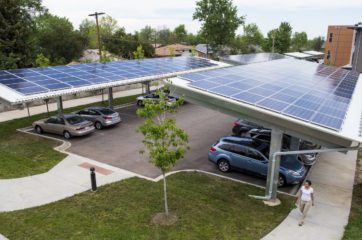A brand new labor-focused climate coalition just launched in the state of Illinois. The Climate Jobs Illinois coalition is composed heavily of labor union representatives and members from across the state’s energy industry, with a mission to “advocate for a clean energy economy at the scale climate science demands, create good union jobs and support more equitable communities,” according to its website.
As the Illinois General Assembly prepares to take action on the Clean Energy Jobs Act (CEJA) when it reconvenes for its veto session in November, Climate Jobs Illinois is expected to advocate for this bill and similar legislation that might follow.
In a state that has lost hundreds of thousands of jobs already during the COVID-19 pandemic, the coalition’s formation represents a grassroots movement to center the economic recovery around clean job creation and support for workers disproportionately impacted by the pandemic and the climate crisis.
Coalition-based advocacy for CEJA
Amongst an array of competing pieces of legislation, the Clean Energy Jobs Act (CEJA) has emerged in the Illinois General Assembly as the most likely candidate for adoption in the near future. The bill seeks to build upon the state’s 2016 Future Energy Jobs Act (FEJA) to continue the advancement towards state energy progress goals while also accounting for the economic impacts of the pandemic on Illinois and its most underserved communities in particular.
The 700-page bill’s lead House sponsor, Rep. Ann Williams (D-Chicago), describes the legislation as having four key pillars – promoting jobs and economic opportunity, putting Illinois on a path to 100% renewable energy by 2050, reducing the equivalent of 1 million gasoline and diesel-powered vehicles from the road, and achieving a carbon-free power-sector by 2030.
Coalition-based advocacy has played a central role in garnering public support for CEJA thus far. Earlier this year, the Illinois Clean Jobs coalition released a poll conducted by the Global Strategy group indicating that 82% of Illinois voters support CEJA. This coalition has made advancement of CEJA its core focus, which seems to make way for the new Climate Jobs Illinois coalition to focus its efforts on advocating for complementary policies that might come next. Climate Jobs Illinois presumably supports the bill as well, given the involvement of SEIU Local 1 as a Climate Jobs Illinois member union that is also a member of Illinois Clean Jobs.
State legislators are expected to move forward on CEJA during this November’s veto session – when the House and Senate typically reconvene to consider bills rejected by the Governor, although movement on other pieces of legislation during this session is not uncommon.
Centering nuclear in the transition
Recent statistics show Illinois is the top producing nuclear state in the nation, as around 12.5% of the country’s nuclear energy comes from the Prairie state. The state boasts 11 nuclear reactors, the most in the nation, and produced 54% of its own in-state energy from nuclear last year. Undoubtedly, at least at present, Illinoisans rely on these reactors for much of their power consumption. But in addition to providing power, these nuclear plants have also long been a source of employment for thousands working across the state.
In pursuit of Governor J.B. Pritzker’s statewide clean energy goals, the crucial role of nuclear plants in the state’s transitional power mix seems evident. But to complicate these matters, energy utility operator Exelon recently made plans to close two of its nuclear plants in the state unless a move is made to subsidize their nuclear fleet. These downstate plants, Dresden and Byron, employ around 1,500 workers combined. Without a deal, the company says both plants are slated to cease operations in the fall of 2021. Two additional plants, Braidwood and LaSalle, may soon be on the chopping block as well. Governor Pritzker and some state legislators remain hesitant to cave to Exelon’s demands, particularly in wake of a massive corruption scandal involving ComEd – the state’s largest utility and a subsidiary of Exelon – bribing state lawmakers in exchange for favorable legislation. After a federal investigation, ComEd recently agreed to pay a $200 million dollar fine for its wrongdoings.
The threat by Exelon appears to be responsible at least in part for Climate Jobs Illinois’s choice to form at this particular moment. The labor unions that make up a sizable portion of the coalition represent thousands of workers at Exelon’s nuclear plants within the state. Though not affiliated with Exelon, the new coalition and its close supporters have already made their voices heard on this issue. The coalition’s executive director, Nikki Budzinski, stated in an interview with Energy News Network that “the current nuclear fleet is important, not just for baseload but for the transition to 100% clean energy.”
The optimal role of nuclear in a clean energy economy remains a contentious point of debate, especially among environmentalists. Groups often disagree on whether subsidizing existing nuclear plants (while renewables like solar and wind scale up) or instead investing those funds directly into renewables is the better path forward. The controversy between aiming for a goal of 100% renewables or simply prioritizing net-zero emissions – which might include nuclear – will continue to be a focal point of discussion.
In Illinois, many climate advocates also fear that the closure of the Byron and Dresden nuclear plants could be offset by an increased reliance on fossil fuels like coal and natural gas. Meanwhile, CJI is carving out a niche amongst other coalitions in the state through advocacy around representing unions made up of those working in renewables, nuclear, and coal alike. State Senator Sue Rezin (R-Morris), endorsed the new coalition via tweet saying, “We don’t have to choose between a cleaner future and hundreds of middle-class jobs. We’ve delivered both for decades at the Dresden nuclear plant. Having [Climate Jobs Illinois] around will keep middle-class jobs at the center of the debate as we look to build a cleaner and better future.”
The impact of COVID-19 on Illinois: a disparity multiplier
Amongst its midwestern peer states, Illinois has been hit exceptionally hard by the coronavirus pandemic. The state ranks 6th in the nation in its total number of confirmed COVID-19 cases, and has suffered an estimated 700,000 lost jobs – many in the energy industry. While few sectors have been spared from the economic downturn initiated by the pandemic, research has shown that the energy industry’s recovery has taken place at a slower speed than other sectors. BW Research estimates that, at present, 14% fewer Americans work in the field of clean energy than pre-pandemic. Within Illinois, this number – although lower – still sits at a concerning 8.9%.
The pandemic has also brought already existing racial and socioeconomic inequalities to the fore and, in many instances, amplified employment disparities. As BW Research Vice President Phil Jordan explained to Energy News Network, “we do know there are disproportionate impacts across the economy particularly for people who are Hispanic, Latino, Latinx or Black — that’s true in clean energy and energy writ large as well.” As Illinois embarks upon its recovery, efforts to center recognition of and response to these disparities are underway.
The launch of the Climate Jobs Illinois coalition indicated a recognition of these disparities, and expressed a commitment to working to address them. Amongst its many goals, the coalition has mentioned seeking to “close the growing income inequality gap in disadvantaged communities” as a central tenet of its philosophy.
Next steps
The most immediate priority for clean energy advocates in the state, members of Climate Jobs Illinois included, remains pushing forward Clean Energy Jobs Act for adoption by the state legislature during their November veto session. It’s clear, however, that this new coalition’s ambitions stretch beyond CEJA.
Over the coming weeks, the group intends to put forward new proposals on wind and solar energy development, upgrades to public transportation, improvements to the energy efficiency of buildings, and ideas on how to best leverage the state’s natural, labor, and educational resources.
Individuals interested in contacting or joining the coalition can do so through their website.









